2023 Genesis G90 Review
Price: $56,998
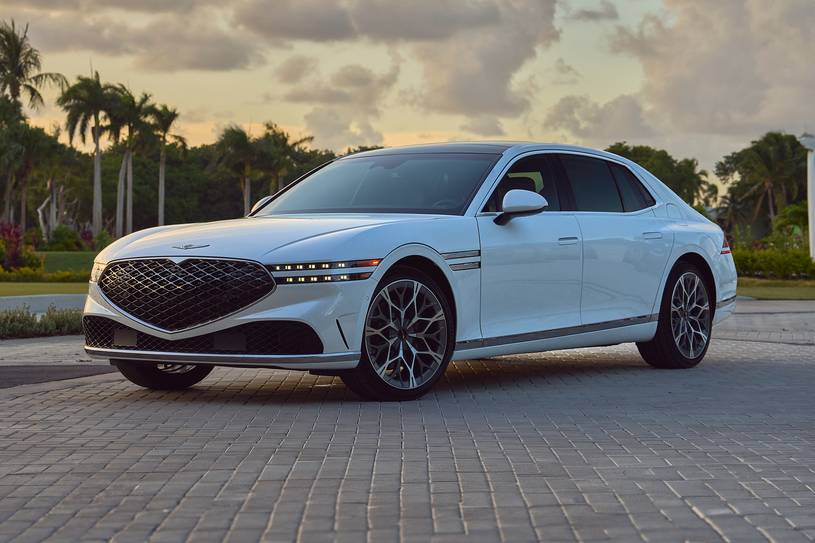 View 132 more photos
View 132 more photos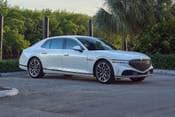 View 132 more photos
View 132 more photos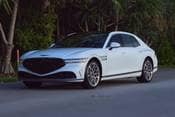 View 132 more photos
View 132 more photos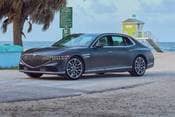 View 132 more photos
View 132 more photos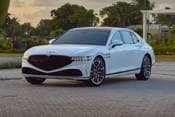 View 132 more photos
View 132 more photos+128
Great
8.1
out of 10
edmunds TESTED
The 2023 Genesis G90 is an appealing alternative to established flagship sedans. It's a stylish vehicle that also offers exceptional value, if such a thing can be said of a six-figure sedan. Cabin quality is impeccable and it's a pleasure to hop behind the wheel. Lackluster smartphone integration and a small trunk are the main qualities that underwhelm.
Appraise my car
Get the Edmunds appraisal report and a no-obligation offer for your car.
By entering your License Plate or VIN, you'll get a more accurate appraisal that may raise your car's value.
2023 Genesis G90 Review
Pros
- Loaded with standard features
- Sophisticated cabin design and materials
- Impressive bundle of safety features and driver aids
Cons
- Small trunk
- Not particularly exciting to drive
- Apple CarPlay and Android Auto require USB cable connection
What's new
- The G90 is fully redesigned
- Two levels of V6 power replace former V8
- Substantial price increase
- Kicks off the second G90 generation
Overview
The Genesis G90 returns with an all-new design, drivetrain and feature list to mark the next generation of Genesis' big luxury cruiser. The new G90 retains the qualities that made it a breakout star — soft ride, ample room, first-class comfort and features — and refines the formula with improved in-car tech, better fuel economy and more sophisticated driver assist features.
For sale near Des Moines, IA
58 listings
- $59,870fair price$1,770 above market
- 30,320 miles
- No accidents, 1 owner, personal use only
- 17 City / 24 Hwy MPG
- Genesis of Norman (489 mi away)
- AWD/4WD
- Bluetooth
- Navigation
- Leather Seats
- Sunroof/Moonroof
Close
Located in Norman, OK
Shop Premium Pre-Owned & Certified Pre-Owned Vehicles at Genesis of Norman Welcome to the all-new Genesis of Norman—your trusted destination for luxur...
AutoCheck Vehicle History Summary
Accident Free Vehicle: Yes
Personal Use Only: Yes
History Provider: AutoCheck
Title Details: Clean Title
Salvage Vehicle: No
Frame Damage: No
Theft History: No
Lemon Status: No
Free History Report: No
Features and Specs:
20 Combined MPG (17 City/24 Highway)
Listing Information:
VIN: KMTFC4SD9PU012726
Stock: SU293359A
Certified Pre-Owned: No
Listed since: 09-15-2025 - $53,298fair price$540 above market
- 38,448 miles
- No accidents, 1 owner, personal use
- 18 City / 26 Hwy MPG
- AutoCenters Nissan (285 mi away)
- AWD/4WD
- Bluetooth
- Navigation
- Leather Seats
- Sunroof/Moonroof
Close
Located in Herculaneum, MO
ONE OWNER with ZERO ACCIDENTS, All Wheel Drive, G90 3.5T, 4D Sedan, AWD, Maui Black, 15 Speakers, Active Cruise Control, Adaptive suspension, Android ...
AutoCheck Vehicle History Summary
Accident Free Vehicle: Yes
Personal Use Only: Yes
History Provider: AutoCheck
Title Details: Clean Title
Salvage Vehicle: No
Frame Damage: No
Theft History: No
Lemon Status: No
Free History Report: No
Features and Specs:
21 Combined MPG (18 City/26 Highway)
Listing Information:
VIN: KMTFB4SD4PU011020
Stock: R85593
Certified Pre-Owned: No
Listed since: 09-17-2025
Among the notable changes is a new V6 engine in two configurations. The standard turbocharged V6 makes 375 horsepower, but the upgraded version adds an electric supercharger that boosts power at lower speeds where the turbo isn't as effective. The result is silky smooth acceleration and imperceptible lag while the turbo winds up. And while the E-Supercharger version isn't quite as potent as the outgoing V8 — 409 hp compared to the V8's 420 hp — it delivers more low-end thrust and slightly better fuel economy. The 2023 Genesis G90 is estimated to get 21 mpg combined in standard trim and 20 mpg combined with the supercharger, gains of between 1 and 3 mpg combined.
Inside, the G90 is just as dazzling as before. Leather and near-leather surfaces abound — Nappa on the seats, microsuede for the headliner, the simulated-yet-sublime leather for the dash, door panels and consoles. The new dash design is more streamlined and linear, with fewer buttons, while dual 12-inch screens display digital gauges, multiple systems' status and infotainment. Dual rotary dials in the center console feel like a user-interface case study — one selects gears, the other controls the touchscreen — with the latter requiring a learning curve to know whether to swipe, rotate, shift or press for a desired result. Clunky dials aside, the whole dash borrows the best elements from Audi and Mercedes-Benz. Even the new "Mood Curator," which tailors cabin lighting, climate control, seat massage and air fragrance to suit different moods, is a nod to the G90's competitors.
Perhaps that helps explain why Genesis has priced the 2023 G90 in between its luxury targets. The new G90 starts about 18% higher than its predecessor and tops out at just under $100,000. It's a lofty, ambitious move but blunts much of the G90's original appeal: European-style luxury at a substantial savings. Though you still get plenty for the money. The top trim comes with an air suspension and rear-wheel steering to aid low-speed maneuvering, and both models come with advanced driver assist systems that can learn the habits of its drivers for more effective semi-automated driving. Whether the new G90 can retain its edge in offering the most for less remains to be seen. Watch this space for additional information, impressions and a full Expert Rating.
Edmunds Expert Rating
edmunds TESTED
Driven, tested, rated by automotive expert Brian Wong
Great
8.1
out of 10
We drove the 2023 Genesis G90 on our test track and on real roads. Our Edmunds team conducts rigorous independent vehicle testing, driving 500,000 miles a year.
Performance
8/10
How does the G90 drive? The G90 has no ambitions of being mistaken for a performance vehicle, and we appreciate its honesty. Our test vehicle came with the upgraded powertrain, and it accelerated from 0 to 60 mph in 5.4 seconds at our test track. That's quick enough for day-to-day use and easy passing power, but it's not going to match the sub-4-second times we found in the hopped-up versions of the BMW 7 Series and Mercedes-Benz S-Class.
The steering feel is very light and low effort, with the resistance through the wheel ramping up while in Sport mode. But there isn't much feedback, and when you turn in, it's not remotely athletic and there's immediate body roll to let you know that this big sedan was made for long, straight drives where its comfort and easy power delivery can really shine.
The steering feel is very light and low effort, with the resistance through the wheel ramping up while in Sport mode. But there isn't much feedback, and when you turn in, it's not remotely athletic and there's immediate body roll to let you know that this big sedan was made for long, straight drives where its comfort and easy power delivery can really shine.
Comfort
9/10
How comfortable is the G90? The G90's ride quality is impeccable. Our test vehicle came with a multi-chamber air suspension that smooths out any bumps and road imperfections with ease. The front seats and the outboard rear seats are plush and very roomy, but that middle rear seat, with its elevated cushion and hard back, is not suitable for more than quick trips. There is barely any noise from the outside, and it's easy to have a conversation with backseat passengers without raising your voice.
Interior
8.5/10
How’s the interior? The G90's interior niceties start with the powered soft-close doors. For the driver, if you hop in and put your foot on the brake the door will even close automatically to make the experience feel even more luxurious. Genesis has opted to use a good number of physical controls. Finding a suitable driving position is a breeze, with plenty of adjustments offered for both the seat and the wheel. Some drivers might find that the touchscreen can be hard to reach, however.
Technology
8/10
How’s the tech? Though it lacks some of the features and extensive voice commands of the infotainment systems in the 7 Series and S-Class, the G90's interface is simpler to use. Our test vehicle came with the optional 23-speaker Bang & Olufsen 3D audio system. It's a phenomenal setup with excellent clarity and powerful bass. Android Auto and Apple CarPlay are both present but require the use of a cable, and that's the biggest reason this score isn't higher. The native navigation system is the infotainment system's biggest weakness. It feels dated compared to the rest of the vehicle, and searching for destinations is cumbersome.
Storage
6.5/10
How’s the storage? For a vehicle with such a large footprint, there isn't a lot of space for storage. The trunk only measures 12 cubic feet for the base model, and if you step up to the mild hybrid, that shrinks to 10.6 cubic feet. That's less than you'll find in more compact sedans (think the Honda Civic). It's enough to fit one large bag but definitely not a second. Inside, things don't get much better. The center console area looks great, but there isn't much storage or good spots to really put everyday items like a phone, purse or wallet.
Fuel Economy
7/10
How’s the fuel economy? Funnily enough, the G90's non-hybrid powertrain is actually a hair more efficient with an EPA-estimated 21 combined mpg, while the supercharged mild hybrid version only gets 20 combined mpg. In our testing with the mild hybrid G90, it beat that figure with an observed fuel economy of 22.5 mpg. These figures match up closely to those put up by the S-Class and 7 Series with their larger engines. But both competitors offer versions that have greater efficiency, while the Genesis does not.
Value
8.5/10
Is the G90 a good value? In the realm of full-size luxury sedans, you'd be hard-pressed to call anything a bargain but dig down into the G90's pricing versus its rivals and it offers an undeniable advantage. The G90 can cost tens of thousands of dollars less than rivals and yet it doesn't give anything up in interior quality or style. All you're losing is the badge, and if that sort of thing is meaningful to you then by all means, step up to the Mercedes-Benz S-Class. But we think those who opt for the Genesis won't be disappointed.
Wildcard
8.5/10
Even in its second generation, the G90 feels like an outsider that's trying to fight its way into the mainstream, and it offers great appeal as an ultra-luxurious alternative to the German sedans that have ruled this segment. On top of that, it's armed with the same features and quality but at a significantly lower price. The design is modern inside and out, turning heads without having to resort to gimmicks or a giant schnoz.
2023 Genesis G90 trim level differences
The 2023 Genesis G90 is a large luxury sedan offered in two trim levels: G90 3.5T AWD and G90 3.5T E-Supercharger AWD. Both are powered by a turbocharged 3.5-liter V6 engine paired with an eight-speed automatic transmission and all-wheel drive. The V6 makes 375 horsepower and 391 lb-ft of torque in base trim. The E-Supercharger trim, like its name implies, adds an electric supercharger for a power boost of 409 hp and 405 lb-ft.
Which G90 trim does Edmunds recommend?
Unless you plan to shuttle backseat VIPs regularly, stick with the standard G90 3.5T AWD. No, it doesn't make as much power as the supercharger-equipped G90 and doesn't come with an air suspension, but we're not convinced those or the other extras — ventilated and massaging rear seats, rear seat smartphone charger, upgraded sound system — are worth the near six-figure price, especially if the back seat is unoccupied most of the time. We'd even prefer the standard models 20-inch wheels for better ride comfort.
Compare 2023 Genesis G90 trim levels
Helpful trims summary and side-by-side comparison chart

Best Luxury SUVs of 2025

These Are the Best Cars We've Tested In 2025 ... So Far

2025 BMW X3 vs. 2025 Genesis GV70: Compact Luxury SUV Showdown

2026 Genesis GV70 First Drive: Making a Great SUV Even Better
Cost to Drive
Monthly estimates based on costs in Iowa
$216/mo for G90 3.5T
G90 3.5T
vs
$188/mo
Avg. Large Car
Genesis G90 Owner Reviews
Most Helpful Owner Reviews
Trending topics
Motor Trend Car of the Year for a reason
5 out of 5 starsBill C., 03/14/2023
2023 Genesis G90 3.5T E-Supercharger 4dr Sedan AWD (3.5L 6cyl Twincharger gas/electric mild hybrid 8A)
Great car! My 3rd G90 and this one exceeded my expectations.
Finally got all wheel drive.
Great riding car with plenty of get up and go with super charger.
Still finding options that I did not know that comes with the car.
Riding in the back seat is a real treat.
The beaurdax brown interior is luxurious! My car turns heads and when gets valet parkers excited. They even love the key … fob.
Just exceeds all my expectations for an automobile. If you get a chance take a test drive at a Genesis dealer near you for an exceptional driving experience.
Super cool car
5 out of 5 starsCole, 03/28/2023
2023 Genesis G90 3.5T E-Supercharger 4dr Sedan AWD (3.5L 6cyl Twincharger gas/electric mild hybrid 8A)
Ive had the car since October 1 2022 and have since put 10,000mi on it. Driving this car is pure serenity. It is ultra quiet down the highway and supremely smooth on roads. Even though there was a substantial price increase, its still a fantastic value for all the features you get. Those include rear wheel steering, full power operated doors, heat, ventilation and massage on all seats, … 26 speaker 3D audio by Band&Olufsen, highway drive assist 2 that works wonders on long trips, etc. Materials are very high quality and the fit and finish is impeccable. Edmunds states 2 cons as being “not exciting to drive” and “as or more expensive than euro counterparts but its not a sport sedan. Its meant for plush quiet refinement when driving not exhilaration. Also if youre getting a base model A8, 7 series, or LS500 yes, those are going to be less expensive. But to spec any of those vehicles with what you get as standard on the G90 E supercharged, youre going to spend between 15-35k more. This car turns heads wherever you go people do double takes on the car all the time and im often asked if its either a Bentley or a new Aston Martin sedan. If you are in the market for a large luxury sedan definitely go and check out this car you wont be disappointed.
Best luxury sedan
5 out of 5 starsDon, 07/01/2023
2023 Genesis G90 3.5T E-Supercharger 4dr Sedan AWD (3.5L 6cyl Twincharger gas/electric mild hybrid 8A)
I have owned numerous large luxury sedans(S500,750LI,XJL,2022 G90).The 2023 G90 is by far the best I have purchased. The ride is so smooth. The interior feels like a spa,especially the back seat.Definitely the best bang for your buck.
Surprised? You bet!
5 out of 5 starsG90Convert, 09/13/2023
2023 Genesis G90 3.5T 4dr Sedan AWD (3.5L 6cyl Turbo 8A)
Having been a Bentley Flyiong Spur owner, this car dumbfounded my senses and my wallet. Not only is the interior precisely finished, the comfort and drive reminded of a car $200,000 more in price. The handling, quiet and interior cabin noise was comparable to the Flying Spur. I was surprised by the attention the car received and not surprisingly due to the unique, confident and strong … design. Do not miss the opportunity to test this out. You will be instantly committed to a luxury brand that is substantially under-valued. The top end model is not worth the buy unless you plan on chauffeuring others around. Check it out!
2023 G90 Highlights
3.5T
| Base MSRP Excludes Destination Fee | $88,400 |
|---|---|
| Engine Type | Gas |
| Combined MPG | 21 MPG |
| Cost to Drive | $216/month |
| Seating | 5 seats |
| Cargo Capacity All Seats In Place | 12.0 cu.ft. |
| Drivetrain | all wheel drive |
| Warranty | 5 years / 60,000 miles |
Safety
Our experts like the G90 models:
- Forward Collision-Avoidance Assist
- Automatically applies the brakes if the vehicle senses an imminent collision.
- Blind-Spot Collision-Avoidance Assist
- Warns you if there's a car in your blind spot or if a car is approaching from the side while you're backing up.
- Lane Keeping Assist
- Warns you and gently steers the vehicle back on course if you start drifting out of your lane.
IIHS Rating
The Insurance Institute of Highway Safety uses extensive crash tests to determine car safety.
- Small Overlap Front Driver-Side TestGood
- Small Overlap Front Passenger-Side TestGood
- Moderate Overlap Front Test – OriginalGood
- Moderate Overlap Front Test – UpdatedNot Tested
- Side Impact Test – OriginalNot Tested
- Side Impact Test – UpdatedGood
- Roof Strength TestNot Tested
- Rear Crash Protection / Head RestraintNot Tested
People who viewed this also viewed
| 5.0 average Rating out of 2 reviews. |
| Starting at $57,100 |
| 4.1 average Rating out of 15 reviews. |
| Starting at $58,200 |
| 1.0 average Rating out of 1 reviews. |
| Starting at $117,750 |
Related Used 2023 Genesis G90 info
Vehicle reviews of used models
- Dodge Durango 2021 Review
- Volvo XC90 2021 Review
- Mclaren GT 2021 Review
- Toyota Camry 2021 Review
- Hyundai Ioniq Plug In Hybrid 2020 Review
- Audi Q3 2021 Review
- Chevrolet Colorado 2020 Review
Shop similar models
- Used Genesis G80 2025
- Used BMW 5-Series 2026
- Used Audi S4 2025
- Used Genesis G70 2026
- Used BMW 8-Series-Gran-Coupe 2026
- Used Kia K900 2020
- Used Audi A8 2025
- Used Lincoln MKS 2016
- Used Audi S7 2025
Shop used vehicles in your area
Popular new car reviews and ratings
Research other models of Genesis
- 2026 G70
- 2026 GV70
- Genesis G90 2025
- New Genesis GV80 Coupe
- New Genesis GV80
- New Hyundai Genesis
- Genesis G70 2024
- 2025 Genesis GV60
- New Genesis G90
- 2025 Genesis G70
Research similar vehicles
Other models
- Used Alfa-Romeo 4C in Manchester, CT 2020
- Used Lincoln MKZ in Winchester, KY 2020
- Used Porsche 718-Boxster in Neenah, WI 2025
- Used Lexus LC in Milford, MA 2025
- Used Jeep Gladiator in Brea, CA 2025
- Used Infiniti J30 in Loganville, GA 1997
- Used Mercedes-Benz Sls-Amg in Terre Haute, IN 2012
- New Cadillac XT4 for Sale in Mount Dora, FL
- Used Chevrolet Cobalt in Hyannis, MA 2010
- Used BMW 2-Series in New Lenox, IL 2025

